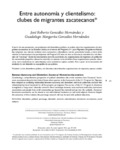
Please use this identifier to cite or link to this item:
http://ricaxcan.uaz.edu.mx/jspui/handle/20.500.11845/222Full metadata record
| DC Field | Value | Language |
|---|---|---|
| dc.contributor | 90730 | |
| dc.contributor.other | 0000-0003-0081-7056 | |
| dc.coverage.spatial | Zacatecas | es_ES |
| dc.creator | González Hernández, José Roberto | |
| dc.creator | González Hernández, Guadalupe Margarita | |
| dc.date.accessioned | 2017-05-03T20:10:21Z | |
| dc.date.available | 2017-05-03T20:10:21Z | |
| dc.date.issued | 2011-08-01 | |
| dc.identifier | info:eu-repo/semantics/publishedVersion | |
| dc.identifier.issn | 1607-050X | es_ES |
| dc.identifier.issn | 2448-5144 | es_ES |
| dc.identifier.uri | http://hdl.handle.net/20.500.11845/222 | |
| dc.description | Considering a comprehensive perspective of political clientelism, this article examines how Zacatecas’ hometown associations based in the United States when operate in the framework of the 3×1 Program for Migrants, have adopted an oscillating relationship between autonomy and clientelism with local authorities and how this relationship has been functional for all the program participants. The success of the 3×1 Program in Zacatecas strengthens a “long route” clientelist network where exchanges between state and local authorities, hometown associations and people from small communities go beyond the material and get into the symbolic. Zacatecas’ hometown associations can be viewed as not-subordinated mediators, as real social subjects. However, despite the autonomy of this mediator, the patronage network still may be used with political objectives. | es_ES |
| dc.description.abstract | A partir de una perspectiva comprehensiva del clientelismo político, se analiza cómo las organizaciones de emigrantes zacatecanos en los Estados Unidos, en el marco del Programa 3×1 para Migrantes del gobierno federal, han adoptado una relación oscilante entre autonomía y clientelismo con las autoridades locales y cómo dicha relación es funcional para los participantes del Programa. El éxito de éste en Zacatecas consolida una red clientelar de "ruta larga" donde los intercambios entre las autoridades, las organizaciones de migrantes y la población de comunidades pequeñas rebasan lo material y se asientan en lo simbólico. Estas organizaciones pueden observarse como mediadoras no subordinadas, como verdaderos sujetos sociales. Pero a pesar de la autonomía del mediador, la red clientelar es susceptible de uso político. | es_ES |
| dc.language.iso | spa | es_ES |
| dc.publisher | Centro de Investigación y Estudios superiores en antropología social | es_ES |
| dc.relation | http://desacatos.ciesas.edu.mx/index.php/Desacatos/article/view/305 | es_ES |
| dc.relation.uri | generalPublic | es_ES |
| dc.rights | Attribution-NonCommercial-ShareAlike 3.0 United States | |
| dc.rights.uri | http://creativecommons.org/licenses/by-nc-sa/3.0/us/ | * |
| dc.source | Desacatos, núm. 36, mayo-agosto 2011, pp. 85-106 | es_ES |
| dc.subject.classification | CIENCIAS SOCIALES [5] | es_ES |
| dc.subject.other | info:eu-repo/classification/Clientelismo político | |
| dc.subject.other | info:eu-repo/classification/Red clientelar | |
| dc.subject.other | info:eu-repo/classification/Subordinación | |
| dc.subject.other | info:eu-repo/classification/Organizaciones de migrantes | |
| dc.subject.other | info:eu-repo/classification/Sujetos sociales | |
| dc.subject.other | info:eu-repo/classification/Clientelism | |
| dc.subject.other | info:eu-repo/classification/Political patronage | |
| dc.subject.other | info:eu-repo/classification/Clientelist network | |
| dc.subject.other | info:eu-repo/classification/Subordination | |
| dc.subject.other | info:eu-repo/classification/Hometown associations | |
| dc.subject.other | info:eu-repo/classification/Social subjects | |
| dc.title | Entre autonomía y clientelismo: clubes de migrantes zacatecanos* | es_ES |
| dc.type | info:eu-repo/semantics/article | es_ES |
| Appears in Collections: | *Documentos Académicos*-- UA Estudios del Desarrollo | |
Files in This Item:
| File | Description | Size | Format | |
|---|---|---|---|---|
| González Hernández, González Hernández - 2011 - Entre autonomía y clientelismo clubes de migrantes zacatecanos.pdf | 423 kB | Adobe PDF |  View/Open |
This item is licensed under a Creative Commons License
